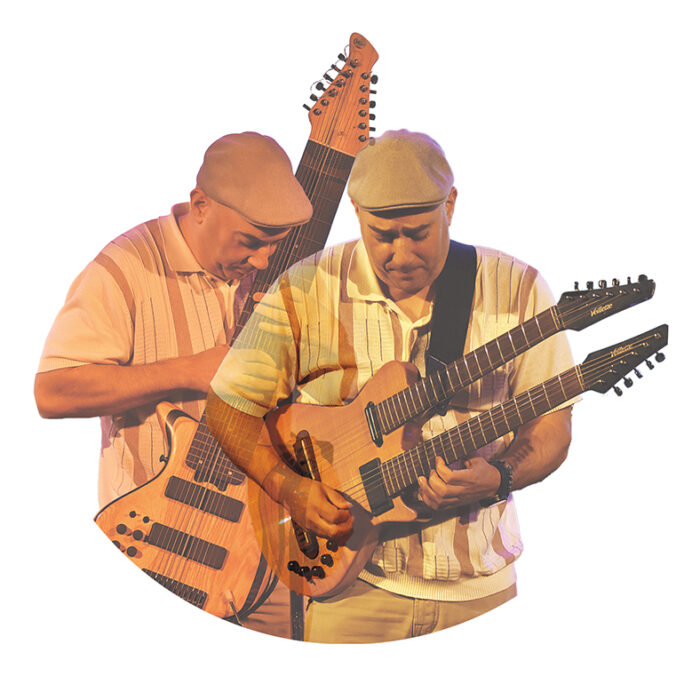As profiled on the 2023 television show, Shades of Us (https://youtu.be/I_xMYUtgAhA), Benjamin Lapidus was born in Hershey, PA in 1972 to first-generation Brooklynites and the family moved almost 15 times before returning to New York City when Lapidus was 14. Trained in piano from a young age, he moved through a variety of instruments including trumpet and bass before concentrating on the guitar. Lapidus was exposed to music by his grandmother and his father, who played in Latin and jazz bands in the Catskills in the 1950s. Through his father’s record collection and stories of his father’s visits with his Latin American relatives, the seeds of Latin music were planted. Yet it wasn’t until the 1980s that the youngest Lapidus became immersed in Latin music, when he moved to a predominantly Latin neighborhood in New York City, where numerous important musicians also resided. Living a block away from Mikel’s jazz club, Lapidus still has vivid memories of practicing in Mario Rivera’s house or seeing Mario Bauzá walk down the street. Deciding he needed a complete musical education, Lapidus earned two degrees from Oberlin Conservatory and Oberlin College, becoming one of the program’s first jazz guitar graduates. In 1994, Lapidus started to play the Puerto Rican cuatro and Cuban tres. After leading his own quartet at festivals and clubs throughout Europe and winning a grant to study briefly with Steve Lacy in Paris, he returned to the U.S. and worked with Joe McPhee, Joe Giardullo, Tani Tabal, Thomas Workman, and other creative improvisers.
At the same time, Lapidus began performing with Larry Harlow, Alex Torres, and other Latin music luminaries in New York and Puerto Rico. Lapidus earned a Ph.D. in Ethnomusicology at the CUNY Graduate Center in 2002. His travels to Cuba acquainted him with distant relatives and grounded him in the music of Eastern Cuba. He has taught popular music of the Caribbean, Latin music in New York, and world music at Queens College and John Jay College of Criminal Justice, CUNY. Today, Lapidus is a tenured professor in the department of art and music at John Jay College of Criminal Justice and on the Doctoral Faculty of the Graduate Center, CUNY. In 2008, Lapidus published the first- ever book on the Eastern Cuban musical genre changüí called Origins of Cuban Music and Dance: Changüí (Scarecrow Press). In addition to having published peer-reviewed articles and book chapters, translations, and reading papers at international conferences, he has written liner notes and served as scholar-in-residence with the Jewish Museum and the New York Center for Jungian Studies during humanitarian missions to the Jewish communities of Cuba from 2004-2017. In 2013, Lapidus won a prestigious National Endowment for the Humanities (NEH) fellowship for his critically acclaimed book New York and the International Sound of Latin Music, 1940-1990 (University Press of Mississippi, 2021). With endorsements from Rubén Blades, Ilán Stavins and other academics around the world, this ground-breaking book has been featured on BBC 3 Music Matters, NPR’s Afropop and Alt.Latino shows as well as the Miami International Book Fair and countless news outlets. The book maintains its bestseller ranking in Amazon’s top 20 salsa books since its release over two years ago.
For the last twenty eight years, Lapidus has performed and/or recorded tres and guitar on film soundtracks, video games, television commercials, and albums with notable musicians such as Juan Pablo Torres, Ibrahim Ferrer (Buena Vista Social Club), Pío Leyva (Buena Vista Social Club), Orlando “Cachaíto” López, Paquito D’Rivera, Cándido Camero, Ruben Blades, Larry Harlow, Bobby Sanabria, Jerry González, Ralph Irizarry, Humberto Ramírez, Harvie S., Dick Hyman, Brian Lynch, Mark Weinstein, Chico Álvarez, Alfredo “Chocolate” Armenteros, Emilio Barretto, Eddie Zervigón, José Fajardo, Rudy Calzado, and many others.
# # #
benjaminlapidus.com
Instagram: @benjamin_lapidus
Twitter: @BenjaminLapidus
